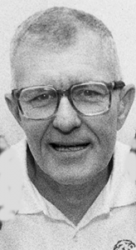Roger Rada Forever an Unsung Hero to TCNJ Athletics
Several alumni and coaches whose lives were touched by Professor Emeritus and longtime coach Roger Rada share their stories about his educational, endearing, and downright persistent ways.


Tracy Warren ’87 wouldn’t be surprised to learn her former softball hitting instructor at The College of New Jersey, Roger Rada, is spending time in retirement working with a Bible study youth group.
“Batting cage time with Mr. Rada was kind of like mass, an hour of dedication,” recalls Warren, the two-time All-American third baseman of what then was known as Trenton State College. “You were with Mr. Rada, taking up everything he preached and then putting it into practice.”
The many people whose lives were touched by Rada have their own stories about his educational, endearing, and downright persistent ways. The 2009–10 academic year is the first in 45 years that he was not on campus influencing young minds. The ever-popular Rada, who first arrived at the College in 1964 as a physical education teacher and assistant baseball and football coach, moved last fall from Ewing to Silver Spring, MD, so he and his wife Virginia would be closer to family.
Not surprisingly, the 80-year-old remains in the swing of things as an assistant softball coach at High Point High School in nearby Beltsville, and as a volunteer with the church group and Fidos for Freedom, which provides service and therapy dogs to people in need.
“He has more energy than I could ever wish for—his passion for the game, his passion for people, his passion for teaching,” says Sally Miller, TCNJ’s softball coach of the last 15 years.
“A teacher gets no further joy than watching students advance and progress,” Rada says. “To see them do that, and then after two years, all of a sudden, you see the light go on in their eyes, like, ‘Ah, I got it,’ it’s a real good feeling when you see that in the students.”
Rada was the College’s head baseball coach from 1965 to 1974 and, after completing a master’s degree in special education in 1977, was asked by June Walker, TSC’s softball coach, to join her program as a volunteer hitting instructor. He remained in that role through the 2009 season, 10 years after retiring as a professor, but still captivating people.
Rada often would be off in some corner of the gym or field unloading his bag of “teaching aids,” which others considered to be gadgets, gizmos, and contraptions. Among his drills, Rada would have players put soccer balls between their knees as they hit volleyballs off a makeshift tee consisting of a cone and a toilet plunger, or try to catch balls thrown at them while balancing on a wooden plank on top of a cylindrical block. He would have batters hit a tennis ball off a bounce to learn to react to the ball instead of the pitcher, and learn to let the bat do the work by swinging and walking through five straight pitches while he backed up in front of them throwing softballs.
“I do believe that if I don’t get a good laugh almost every practice that I’m getting too serious,” says Rada, who often rode his 1950s cruiser bicycle to campus. “My philosophy is, try to be positive with all you can and just start from the beginning and fill in the gaps, get them to the point where they don’t have to think about what they’re doing. They have the ability. Don’t try to let it happen, let it happen.”
Says Gina Bilotti ’88, a member of the 1983 softball team that won the first of the program’s six NCAA Division III national titles: “He is the kind of guy that he can take the most difficult thing he needs to teach you in terms of a skill, and he makes it effortless. It’s his personality. It’s how he talks to you. He makes you think you can do it before you’ve even tried.”
“He has a way about him that makes you want to learn, understand, and enjoy it, too,” says Ilene Cohen ’88, who, like Warren, was a member of the 1987 national championship team.
Warren arrived at the College as a talented Division I transfer only to learn she had a lot still to learn from the unflappable Rada. He always gets to the point with his protégés, and with Warren he changed everything from her batting stance to picking up the release point of the ball, to how hard she swung and shifted her weight.
“He would see our frustration, but he had faith in terms of teaching us how to hit that he just kept persevering and persevering, and it really paid off,” Warren says. “And his delight was that he would come to almost every practice, he’d come to almost every game, but he was so humble in that he would take very little thanks and praise for what he did, although he was principally responsible for any offense we were able to muster.
“The College of New Jersey softball wouldn’t be where they are today without him,” Warren added.
Posted on April 30, 2010

